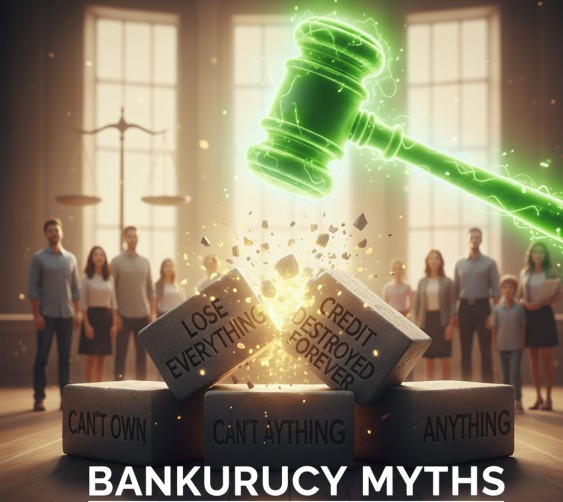This episode of bankruptcy explained tackles four big myths that keep people stuck in debt: shame, fear of ruined credit, fear of losing everything, and fear that everyone will find out. Philip Tirone breaks down how the system is built, why bankruptcy can speed up credit recovery, what property exemptions protect, and how privacy really works. Watch the video, or check out the FAQs!
Frequently Asked Questions
- Is bankruptcy something to be ashamed of?
- Will bankruptcy destroy my credit forever?
- Is it faster to rebuild credit after bankruptcy than while stuck in debt?
- Will I lose everything I own if I file bankruptcy?
- What debt do I actually “lose” in bankruptcy?
- Will everyone find out that I filed bankruptcy?
- What does filing bankruptcy say about my character?
- How do I rebuild credit after bankruptcy without carrying debt?
- Can I reach a 720 credit score within a year of Chapter 7?
- Why do lenders push the idea that bankruptcy ruins your life?
- What program can help me rebuild after I file?
- How do exemptions work and who explains what I can keep?
FAQ: Is bankruptcy something to be ashamed of?
Bankruptcy is not something to be ashamed of, because the shame you feel was manufactured by lenders who profit when you stay in debt. Most people were never taught how credit and compounding work, so falling behind is common and fixable. Trade shame for a plan that puts you back in control.
FAQ: Will bankruptcy destroy my credit forever?
Bankruptcy will not destroy your credit forever, and for many people scores rise after filing because missed payments stop and cash flow improves. With bills paid on time and balances low, rebuilding happens faster than slogging through months of late fees and collections. Think GPA: one old “F” is outweighed by a long run of A’s.
FAQ: Is it faster to rebuild credit after bankruptcy than while stuck in debt?
It is faster for many people to rebuild credit after bankruptcy because discharge frees cash to pay essentials on time, which drives scores upward. Staying in debt often means repeated lates that keep scores suppressed. Clean up your reports, make every new payment on time, and your score will climb faster.
FAQ: Will I lose everything I own if I file bankruptcy?
You will most likely not lose everything you own, since most exemptions protect essentials like your home equity within limits, your car, clothing, household goods, and retirement accounts. Most filers keep what matters and shed unsecured debts like credit cards, medical bills, and payday loans. Secured debts are typically kept if you are current and the deal makes sense.
FAQ: What debt do I actually “lose” in bankruptcy?
You lose unsecured debt in bankruptcy, which usually means credit cards, medical bills, payday loans, and personal loans not tied to collateral. Getting rid of those payments makes room for rent, mortgage, utilities, and insurance to be paid on time. That stability is the real win.
FAQ: Will everyone find out that I filed bankruptcy?
Most likely, people will not find out that you filed bankruptcy because although cases are public record, they are not publicized. Your neighbors, friends, family, and employer will not know unless you tell them. Most people keep it private, recover, and move on.
FAQ: What does filing bankruptcy say about my character?
Filing bankruptcy says you took a legal, responsible step to protect your future and your family. Choosing a clean slate over endless fees is courage, not failure. The smartest move is the one that stops the damage and lets you rebuild.
FAQ: How do I rebuild credit after bankruptcy without carrying debt?
You rebuild credit after bankruptcy by opening three low-limit credit cards, putting tiny automated charges on each, and paying them in full monthly. Add one installment line that reports your payments, keep utilization under 10 percent, and monitor all three bureaus for accuracy. This creates steady positive data without interest.
FAQ: Can I reach a 720 credit score within a year of Chapter 7?
You can reach a 720 within months in some cases by combining three cards, one installment account, perfect on-time payments, and zero carried balances. That said, most people reach 720 within 12 to 24 months, assuming they follow the steps outlined in 7 Steps to a 720 Credit Score, our free credit-education class. For best results, clean any reporting errors quickly so your new history is visible.
FAQ: Why do lenders push the idea that bankruptcy ruins your life?
Lenders push the ruin myth because fear keeps people paying interest and late fees longer. When you understand the rules, you stop subsidizing their profits and start funding your own recovery. Education turns a rigged game into winnable steps.
FAQ: What program can help me rebuild after I file?
A structured credit rebuild program can help you rebuild after you file by giving clear steps and automation. Evergreen Financial Counseling enrolls clients in 7 Steps to a 720 Credit Score after the debtor education course, and the Credit Rebuilder Program upgrade can accelerate results in as little as six months.
FAQ: How do exemptions work and who explains what I can keep?
Exemptions are state-specific rules that protect essential property, and your bankruptcy attorney explains exactly what applies where you live. With proper planning, most filers keep their core assets and peace of mind. Ask for a state-by-state exemption walkthrough during your consultation.


